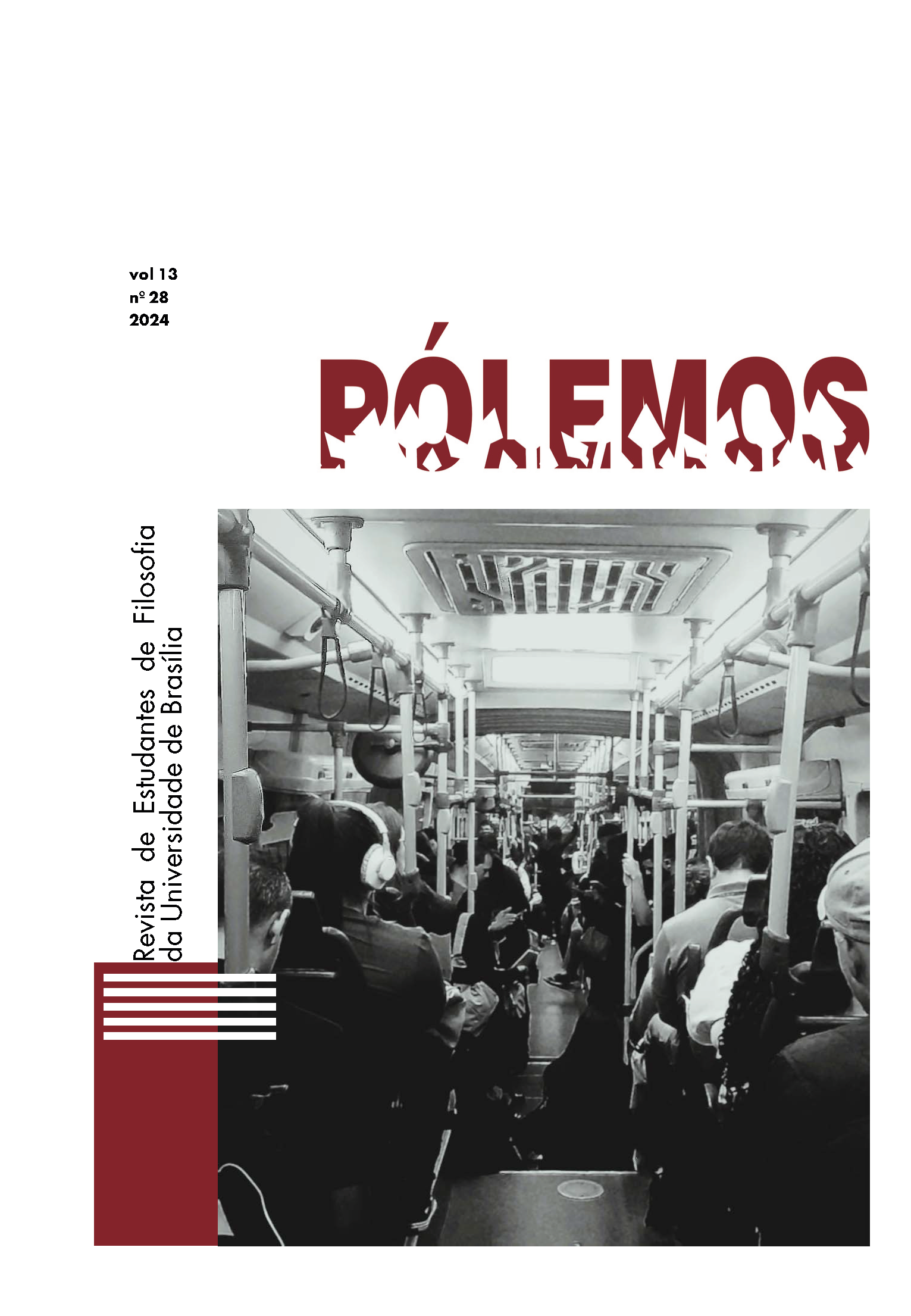“WOUNDS THAT HEAL LEAVING SCARS”
Zupančič against Marcuse and a critique of the place of sexuality in Eros and Civilization
DOI:
https://doi.org/10.26512/pl.v13i28.54204Keywords:
Sexuality. Herbert Marcuse. Alenka Zupančič. Philosophy of psychoanalysis. Negativity.Abstract
This article seeks to, in light of the theoretical contributions furnished by Alenka Zupančič in her work What is Sex? (2017) and of contributions provided by contemporary thinkers also inspired by a lacanian reading of psychoanalysis, such as Gabriel Tupinambá (2018) and Vladimir Safatle (2004), establish a critique of the treatment of the concept of sexuality given inside the text Eros and Civilization,(1955) of Herbert Marcuse. Therefore, firstly, the marcusean project of Eros and Civilization shall be reconstructed. Next, the conceptualization of sexuality elaborated by Zupančič shall be exposed. Finally, contrasting both systems thus presented, along with contributions given by thinkers adjacent to the theoretical line of Zupančič, it shall be shown that Marcuse does not conceive sexuality in its conceptuais pertinence and, thus, ends up inhibiting that which allows psychoanalysis to act as an autonomous field in a conflictive totality which philosophy cannot adequately address.
Downloads
References
BADIOU, Alain. Being and Event. Londres: Continuum, 2005.
BADIOU, Alain. Logics of the Worlds. Londres: Continuum, 2009.
CARNEIRO, Silvio Ricardo Gomes. O discurso ontológico e a teoria crítica de Marcuse: gênese da filosofia da psicanálise (1927-1955). São Paulo, 249 p. Dissertação (Mestrado em Filosofia) – Faculdade de Filosofia, Letras e Ciências Humanas, Universidade de São Paulo, 2008.
CHO, Daniel. Thanatos and civilization: Lacan, Marcuse, and the death drive. Policy Futures in Education, v. 4, n. 1, p. 18-30, mar. 2006. DOI: https://doi.org/10.2304/pfie.2006.4.1.18.
DE GENARO, Ednei. Sexualidade e crítica social: Marcuse após Foucault. CSOnline: Revista Eletrônica de Ciências Sociais, dez. 2008. Disponível em: https://periodicos.ufjf.br/index.php/csonline/article/view/17085. Acesso em: 02 jun. 2024.
FEENBERG, Andrew. The Ruthless Critique of Everything Existing: Nature and Revolution in Marcuse's Philosophy of Praxis. Nova Iorque: Verso, 2023.
FONG, Benjamin Y.; JENKINS, Scott. Society, regression, psychoanalysis, or ‘Capitalism is responsible for your problems with your girlfriend’: on the use of psychoanalysis in the work of the Frankfurt School. In: BEST, B.; BONEFELD, W.; O’KANE, C. (Org.). The SAGE Handbook of Frankfurt School Critical Theory. Londres: SAGE Publications, 2018, v. 2, pp. 952-969.
FREUD, Sigmund. Civilization and its Discontents. In: FREUD, S.; STRACHEY, J. (Org.). The Standard Edition of The Complete Psychological Works of Sigmund Freud. Trad. James Strachey. Londres: The Hogarth Press, 1931, v. XXI, pp. 64-145.
HEGEL, G.W.F. Fenomenologia do Espírito. 9. ed. Trad. Paulo Meneses. Petrópolis: Vozes, 2022.
JAMESON, Frederic. Marxism and Form: Twentieth-Century Dialectical Theories of Literature. Nova Jersey: Princeton University Press, 1971.
JAY, Martin. A Imaginação Dialética: História da Escola de Frankfurt e do Instituto de Pesquisas Sociais, 1923-1950. Trad. Vera Ribeiro. Rio de Janeiro: Contraponto, 2008.
KELLNER, Douglas. Herbert Marcuse and the Crisis of Marxism. Los Angeles: University of California Press, 1984.
LACAN, Jacques. Écrits. Paris: Seuil, 1966.
LAPLANCHE, Jean; PONTALIS, Jean-Bertrand. Vocabulário da Psicanálise. Trad. Pedro Tamen. 7. ed. São Paulo: Martins Fontes, 1983.
LEBRUN, Gérard. Os dois Marcuse. In: LEBRUN, G. Passeios ao Léu: Ensaios. São Paulo: Brasiliense, 1983, pp. 132-142.
MARCUSE, Herbert. Eros and Civilization: A Philosophical Inquiry into Freud. Boston: The Beacon Press, 1955.
MARCUSE, Herbert. One-Dimensional Man: Studies in the Ideology of Advanced Industrial Society. 2. ed. Nova Iorque: Routledge, 2002.
MACINTYRE, Alasdair. Herbert Marcuse: An Exposition and a Polemic. Nova Iorque: Viking Press, 1970.
PRADO JR., Bento. Entre o alvo e o objeto do desejo: Marcuse, crítico de Freud. Artepensamento: Ensaios Filosóficos e Políticos, 1990. Disponível em: https://artepensamento.ims.com.br/item/entre-o-alvo-e-o-objeto-do-desejo-marcuse-critico-de-freud/. Acesso em: 02 jun. 2024.
SAFATLE, Vladimir Pinheiro. Auto-reflexão ou repetição: Bento Prado Jr. e a crítica ao recurso frankfurtiano à psicanálise. Ágora, São Paulo, v. 7, n. 2, p. 279-292, jul./dez. 2004. DOI: https://doi.org/10.1590/S1516-14982004000200007.
SCHILLER, Friedrich. A Educação Estética do Homem numa Série de Cartas. Trad. Márcio Suzuki e Roberto Schwarz. São Paulo: Iluminuras, 2002.
TUPINAMBÁ, Gabriel. What is sex… if love is possible?. Continental Thought and Theory, Canterbury, v. 2, n. 2, p. 117-138, ago. 2018. DOI: http://dx.doi.org/10.26021/235.
WHITEBOOK, Joel. Perversion and Utopia: A Study in Psychoanalysis and Critical Theory. Cambridge: MIT Press, 1996.
ŽIŽEK, Slavoj. The Sublime Object of Ideology. Londres: Verso, [1989] 2008a.
ŽIŽEK, Slavoj. Incontinence of the Void: Economico-Philosophical Spandrels. Cambridge: MIT Press, 2018b.
ZUPANČIČ, Alenka. Why Psychoanalysis: Three Interventions. Nova Iorque: NSU Press, 2008a.
ZUPANČIČ, Alenka. The Odd One In: On Comedy. Cambridge: MIT Press, 2008b.
ZUPANČIČ, Alenka. Not-mother: On Freud’s Verneinung. e-flux Journal, mar. 2012. Disponível em: https://www.e-flux.com/journal/33/68292/not-mother-on-freud-s-verneinung/. Acesso em: 10 out. 2024.
ZUPANČIČ, Alenka. What Is Sex?. Cambridge: MIT Press, 2017.
ZUPANČIČ, Alenka. Too much of not enough: An interview with Alenka Zupančič. Entrevista concedida a Cassandra B. Seltman. Los Angeles Review of Books, mar. 2018. Disponível em: https://lareviewofbooks.org/article/too-much-of-not-enough-an-interview-with-alenka-zupancic/. Acesso em: 02 jun. 2024.
Downloads
Published
Issue
Section
License
Copyright (c) 2024 PÓLEMOS – Revista de Estudantes de Filosofia da Universidade de Brasília

This work is licensed under a Creative Commons Attribution-NonCommercial-NoDerivatives 4.0 International License.
Todos os trabalhos que forem aceitos para publicação, após o devido processo avaliativo, serão publicados sob uma licença Creative Commons, na modalidade Attribution-NonCommercial-NoDerivatives 4.0 International Public License (CC BY-NC-ND 4.0). Esta licença permite que qualquer pessoa copie e distribua a obra total e derivadas criadas a partir dela, desde que seja dado crédito (atribuição) ao autor / Ã autora / aos autores / às autoras.


